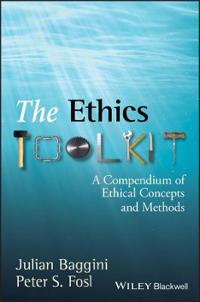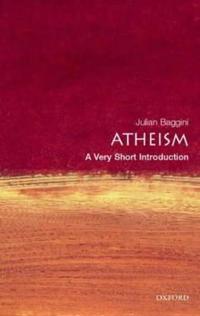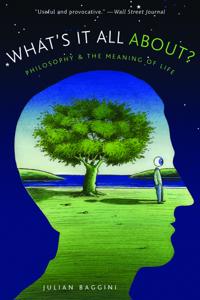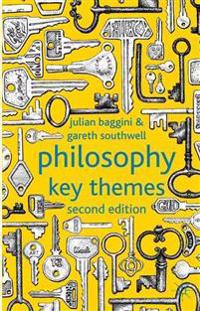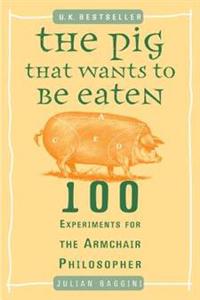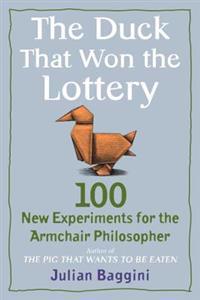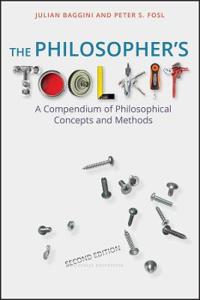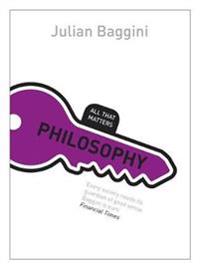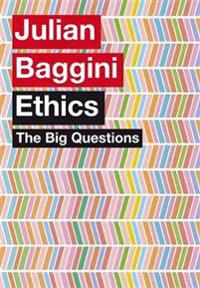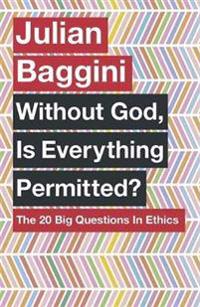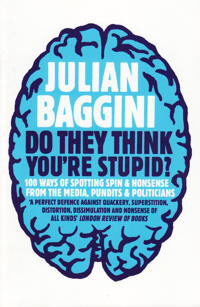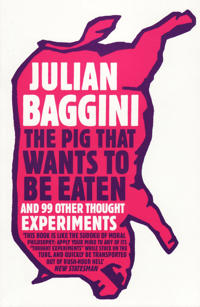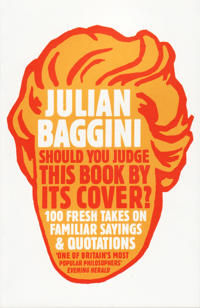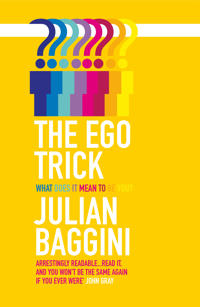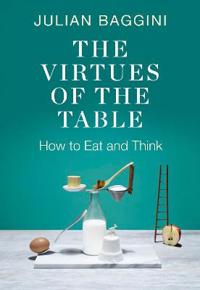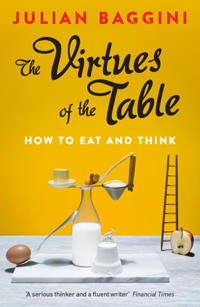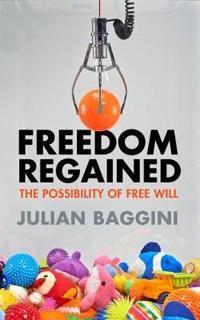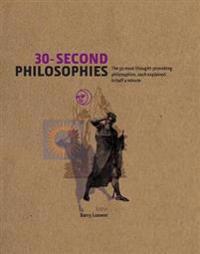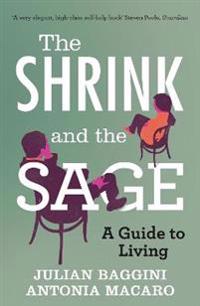The Ethics Toolkit: A Compendium of Ethical Concepts and Methods (Häftad)
avJulian Baggini, Peter S. Fosl, Baggini
ISBN: 9781405132312 - UTGIVEN: 200710The Ethics Toolkit provides an accessible and engaging compendium of concepts, theories, and strategies that encourage students and advanced readers to think critically about ethics so that they can engage intelligently in ethical study, thought, and debate. * Written by the authors of the popular T[...]
Atheism (Häftad)
avJulian Baggini
ISBN: 9780192804242 - UTGIVEN: 200306Atheism is often considered to be a negative, dark, and pessimistic belief which is characterized by a rejection of values and purpose and a fierce opposition to religion. Atheism: A Very Short Introduction sets out to dispel the myths that surround atheism and show how a life without religious beli[...]
What's It All About? (Häftad)
avJulian Baggini
ISBN: 9780195315790 - UTGIVEN: 201008What is the meaning of life? It is a question that has intrigued the great philosophers-and has been hilariously lampooned by Monty Python. Indeed, the whole idea strikes many of us as vaguely pompous and perhaps more than a little absurd. Is there one profound answer, an ultimate purpose behind hum[...]
Philosophy (Pocket)
avJulian Baggini, Gareth Southwell
ISBN: 9780230296626 - UTGIVEN: 2012-05-15Designed for complete beginners, Philosophy: Key Texts is an introduction to philosophy and gives a clear, readable overview of some of the major texts of Plato, Descartes, Hume, Mill and Nietzsche. As well as providing help in how to analyze these sources, the authors encourage the reader to questi[...]
Philosophy: Key Themes (Inbunden)
avJulian Baggini, Gareth Southwell
ISBN: 9780230296633 - UTGIVEN: 2012-04Philosophy can often seem difficult and off-putting to the beginner, who can be intimidated by its jargon and confused by its subtlety of argument. The aim of this book is therefore to act as a no-nonsense guide for the student and general reader, clearly setting out the main arguments and ideas of [...]
Philosophy (Pocket)
avJulian Baggini, Gareth Southwell
ISBN: 9780230296640 - UTGIVEN: 2012-04-13Philosophy: Key Themes is a beginner's guide to understanding and critiquing philosophical arguments. Each chapter introduces one of the major themes in philosophy. Baggini's approach combines explanation with summary while encouraging the reader to question the arguments and positions presented.[...]
The Pig That Wants to Be Eaten: 100 Experiments for the Armchair Philosopher (Häftad)
avJulian Baggini
ISBN: 9780452287440 - UTGIVEN: 200607A collection of one hundred philosophical puzzles from a range of sources brings abstract concepts and ideas into concrete terms that encourage readers to seek their own conclusions about a broad spectrum of moral, social, and personal issues and problems. Original. 35,000 first printing.[...]
Do You Think What You Think You Think? (Häftad)
avJulian Baggini, Jeremy Stangroom
ISBN: 9780452288652 - UTGIVEN: 2007-09Explore the gray areas in your gray matter?philosophical brainteasers from the bestselling author of "The Pig That Wants to Be Eaten"
Is your brain ready for a thorough philosophical health check?
The author of the international bestseller "The Pig That Wants to Be Eaten" and his fellow fo[...]The Duck That Won the Lottery: 100 New Experiments for the Armchair Philosopher (Häftad)
avJulian Baggini
ISBN: 9780452295414 - UTGIVEN: 200904From the author of the "hugely entertaining"("Publishers Weekly") "The Pig That Wants to Be Eaten," lessons in debunking the faulty arguments we hear every day
This latest book from the pop philosophy author of "The Pig That Wants to Be Eaten" tackles an endlessly fascinating area of popular deb[...]Hans Von Bulow's Letters to Johannes Brahms (Inbunden)
avJulian Baggini
ISBN: 9780810882157 - UTGIVEN: 201110Hans von Bulow (1830-1894) is a towering figure of late 19th-century music. In his early years, he was crucial to championing Franz Liszt's instrumental works. He would also conduct the premieres of Richard Wagner's musical dramas Tristan and Isolde and The Mastersingers and become the first to perf[...]
The Ethics Toolkit: A Compendium of Ethical Concepts and Methods (Inbunden)
avJulian Baggini
ISBN: 9781405132305 - UTGIVEN: 2007-08-31The Philosopher's Toolkit: A Compendium of Philosophical Concepts and Methods (Häftad)
avJulian Baggini, Peter S. Fosl
ISBN: 9781405190183 - UTGIVEN: 201004The second edition of this popular compendium provides the necessary intellectual equipment to engage with and participate in effective philosophical argument, reading, and reflection Features significantly revised, updated and expanded entries, and an entirely new section drawn from methods in the[...]
Philosophy: All That Matters (Häftad)
avJulian Baggini
ISBN: 9781444155839 - UTGIVEN: 201205In this book: "Philosophy is like fish: best presented without too much adornment; hard to get just right and easy to ruin." What's the point of it all? In Philosophy: All That Matters, bestselling philosopher Julian Baggini shows how abstract ideas feed into the most important existential questions[...]
Big Questions: Ethics (Inbunden)
avJulian Baggini
ISBN: 9781780870342 - UTGIVEN: 201210In 'The Big Questions: Ethics' Julian Baggini, one of Britain's best-known philosophers, condenses complex, contemporary issues of right and wrong into 20 key questions.[...]
Without God, is Everything Permitted? (Storpocket)
avJulian Baggini
ISBN: 9781780875972 - UTGIVEN: 2014-10Can it ever be right to kill? Is terrorism ever justified? Should euthanasia be legal? Are some people superior to others? Do animals have rights? Some ethical judgements are easy: one side is wrong and the other is right. But how do we handle the really tough 'right vs right' dilemmas, where each s[...]
Complaint (Häftad)
avJulian Baggini
ISBN: 9781846680632 - UTGIVEN: 2010-07Complaint can be a powerful political tool. Nelson Mandela and Martin Luther King both used it to drive social change. So why do we moan about increasingly trivial things - like the weather or public transport? From Adam and Eve to the Iraq War, this title analyzes what we complain about, how and wh[...]
Do They Think You're Stupid? (Häftad)
avJulian Baggini
ISBN: 9781847080837 - UTGIVEN: 201003Originally published as "The Duck that Won the Lottery", this companion volume to "The Pig That Wants To Be Eaten" provides another rapid-fire selection of short, stimulating and entertaining capsules of philosophy. It focuses on the bad argumentative moves people use all the time, in politics, the [...]
Pig That Wants to be Eaten (Häftad)
avJulian Baggini
ISBN: 9781847081285 - UTGIVEN: 201003Presents 100 thought experiments - short scenarios which pose a problem in a vivid and concrete way - and invites readers to think about possible answers for him/herself. This book includes experiments that cover identity, religion, art, ethics, language, knowledge and more.[...]
Should You Judge This Book by Its Cover? (Häftad)
avJulian Baggini
ISBN: 9781847081551 - UTGIVEN: 2010-03Should you really do as the Romans do when in Rome and practice what you preach? Is the grass always in fact greener on the other side of the fence, and is there ever smoke without fire? The author applies his philosophical scalpel to famous sayings, proverbs and pieces of homespun wisdom.[...]
The Ego Trick (Pocket)
avJulian Baggini
ISBN: 9781847082732 - UTGIVEN: 201209Are you still the person who lived fifteen, ten or five years ago? Fifteen, ten or five minutes ago? Can you plan for your retirement if the you of thirty years hence is in some sense a different person? What and who is the real you? Does it remain constant over time and place, or is it something mu[...]
Virtues of the Table (Häftad)
avJulian Baggini
ISBN: 9781847087140 - UTGIVEN: 2014-01An entertaining and thought-provoking look at the food on our plates, and what it can teach us about being human, from the author of The Ego Trick and The Pig That Want's to be Eaten[...]
The Virtues of the Table (Häftad)
avJulian Baggini
ISBN: 9781847087157 - UTGIVEN: 2014-12How we eat, farm and shop for food is not only a matter of taste. Our choices regarding what we eat involve every essential aspect of our human nature: the animal, the sensuous, the social, the cultural, the creative, the emotional and the intellectual. Thinking seriously about food requires us to c[...]
Freedom Regained (Häftad)
avJulian Baggini
ISBN: 9781847087171 - UTGIVEN: 2015-04A smart, engaging and thought-provoking exploration of the concept of free will, from one of Britain's most respected and popular philosophers[...]
30-Second Philosophies (Inbunden)
avStephen Law, Julian Baggini
ISBN: 9781848311626 - UTGIVEN: 201008A full-colour illustrated tour through philosophy's most famous - and most mind-bending - ideas
The Shrink and the Sage (Häftad)
avJulian Baggini, Antonia Macaro
ISBN: 9781848313774 - UTGIVEN: 201205Based on their Financial Times Weekend column, philosopher Julian Baggini and his psychotherapist partner Antonia Macaro offer intriguing answers to life's questions. Can infidelity be good for you? What does it mean to stay true to yourself? Must we fulfil our potential? Self-help with a distinctly[...]

